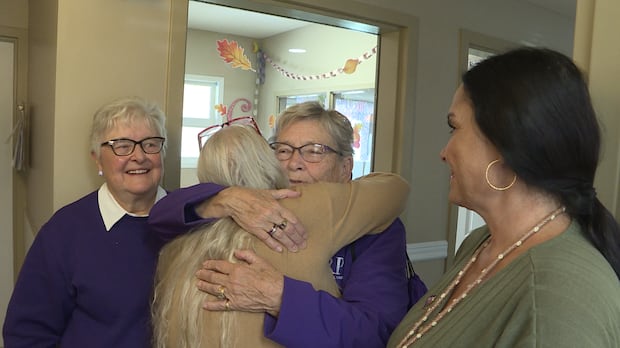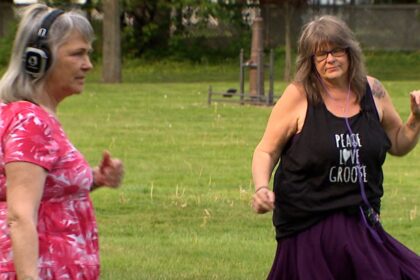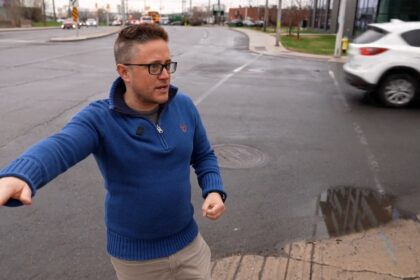SaskatchewanAngie Smith hopes sharing her story of intimate partner violence (IPV) that left her with a brain injury will encourage other survivors to seek help.Canadian Royal Purple raising awareness of brain injuries from intimate partner violenceLisa Risom · CBC News · Posted: Oct 14, 2025 8:00 AM EDT | Last Updated: 3 hours agoMembers of Prince Albert Royal Purple hug employees of the Prince Albert Safe Shelter. (Lisa Risom/CBC News)Warning: this story contains descriptions of intimate partner violence.Angie Smith hopes sharing her story of intimate partner violence (IPV) that left her with a brain injury will encourage other survivors to seek help.Smith is vice-president of the Manitoba chapter of Canadian Royal Purple, a service organization that has taken on brain injuries as its primary cause and launched a national awareness campaign.“As a survivor myself with a brain injury, it was something I wanted to be involved in,” she said.Smith endured IPV in her early twenties. She said she faced shame and stigma alongside the physical abuse.“I was somebody who didn’t want to have bruises to be shown in public, because I felt ashamed of that. I didn’t want my family to know, so I always protected my face, but in those instances, my abuser would strike the back of my head,” Smith said.Smith ended the relationship, but her brain injury wasn’t diagnosed until 15 years later, when she had a hearing test as part of a job requirement.“They asked me at the hearing centre if I had been in a car accident. And when I said, no, I have never been in a car accident, then they asked, ‘do you play sports?’” Smith said.Then she recalled the attack that led to the injury.“My ears were ringing for days. I was dizzy. I had vision problems. Doctors dismissed it. It was a small town. We didn’t really have a lot of resources,” Smith said.Her head trauma caused permanent hearing loss, rendering her almost deaf in her left ear.Angie Smith at 19 and 20 years old. (Submitted by Angie Smith)Brain injuries among IPV victims are underdiagnosed, according to neuroscientist and University of British Columbia Professor Paul van Donkelaar.“Almost all of them are undiagnosed, typically because there’s barriers to seeking out appropriate care. The health-care providers potentially don’t have enough knowledge of the potential intersection,” van Donkelaar said.Van Donkelaar said the cause of symptoms is often masked by life circumstances. They can vary from mild to severe and include headaches, problems thinking, memory loss, mood changes, sleep disruptions, and vision and hearing problems.“Typically, when a mild brain injury occurs, a small handful of these symptoms will be present and will vary from one person to another,” van Donkelaar said.Four out of ten Canadian women endure IPV in their lifetime, according to the latest Statistics Canada reports. The World Health Organization says it’s one in three women worldwide.“In that one in three, 75 to 90 per cent will have sustained hits or punches to the head, having their head hit against a wall or a hard object — strangulation or cutting off the airflow to their brain,” said Tori Dach, manager of Cridge Brain Injury Services in Victoria, B.C.For every NHL Player who sustains a concussion, 5,500 to 7,000 women sustain concussions from IPV, according to Dach’s organization.“In the emergency room they are often met with the misdiagnosis of mental health,” Dach said.Royal Purple declared October as Brain Love Month and is hosting events in more than 300 communities across Canada. It’s encouraging people to wear purple on Oct. 16, Purple Thursday, to show support for survivors and spark discussions.Prince Albert Royal Purple plans to deliver care bags to the Prince Albert Women’s Shelter on the day as part of 5,000 care bags to be delivered to shelters across Canada. The bags contain information describing the symptoms of brain injuries and signs of an abusive relationship.Prince Albert’s Royal Purple chapter delivering care bags to the Prince Albert Safe Shelter in 2024. (Submitted by Elaine Perkins)Front-line workers at the Prince Albert Safe Shelter say they regularly encounter women who have suffered head trauma. Supervisor Brendalee Pellerin recounted a severe case.“He would abuse her by using a two by four and hitting her in the head. And she made no connection because of the injuries. She made no connection to maybe possibly having, you know, a swelled brain or a brain bleed,” she said.Sandi Lougheed, chairperson of Canadian Royal Purple’s charitable initiatives committee, said the group’s members, “represent what we call the voice of the volunteer.”“We’re the people who live in the communities where this is happening,” she said.“We need to bring our story out to the researchers, to the government to advocate and say, we care.” Lougheed said brain injuries from IPV are 100 per cent preventable.“You just have to stop the violence,” she said.Support is available for anyone affected by intimate partner violence. In Saskatchewan,www.pathssk.org has listings of available services across the province. You can access support services and local resources in Canada by visiting this website. If your situation is urgent, please contact emergency services in your area.GETTING HELP:1-800-799-SAFE (7233)OR TEXT “START” TO 88788 ABOUT THE AUTHORLisa Risom has two decades of multimedia journalism experience in northeast Saskatchewan. She joined CBC Prince Albert in 2025.
Stop the violence: Womens group shining light on brain injuries among abuse victims











